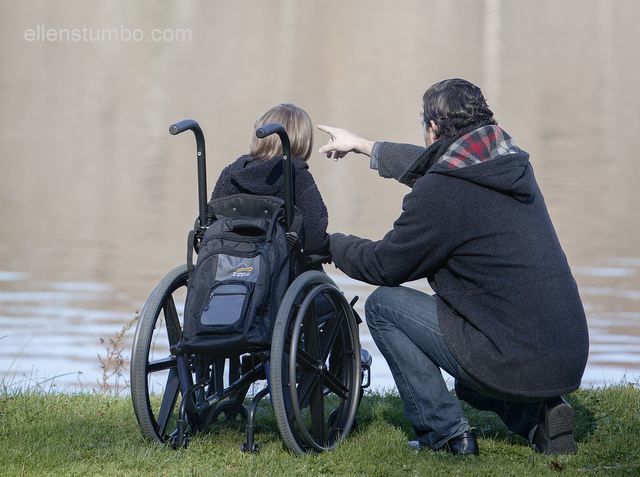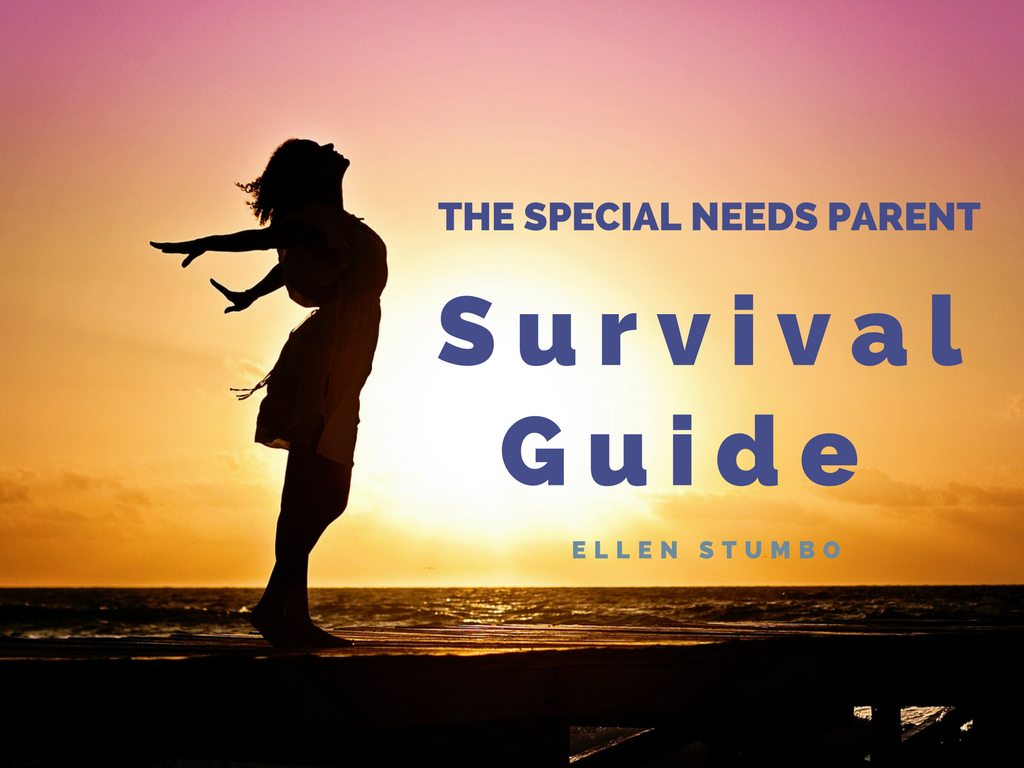“I hate having cerebral palsy!” Just a few months ago, these were not uncommon words to hear from my middle daughter. But then one big thing happened for her and for me – last Thanksgiving we met new friends, twin sisters with cerebral palsy, and for the first time Nina felt she could look at someone and say, “They are like me!” I believe because of them, she has felt empowered and she is learning to accept her disability as part of who she is. And because of our two new friends, I’ve learned about what my words and actions can communicate to my daughter about her disability.

In a conversation with one of our friends, she mentioned that how parents talk about adaptive equipment, for example, can communicate negative things about the child’s disability. “This wheelchair is so heavy!” Could be internalized as, “I create extra work for my parents, I am a burden.” This was powerful for me to hear, I began to wonder what my daughter thought I felt about her disability.
So I had a conversation with her about this.
“Nina,” I said, “What do you think I feel about your wheelchair?”
“Hmmm,” she took a little while, “I don’t think you like it.”
“And why do you think that?”
“Well, I know you want me to walk.” She said.
“So how do you think I feel about your cerebral palsy?”
“Well…I don’t know.” She gave me a thumbs down, then up, then she settled with an almost thumbs down.
Oh no, I don’t want her to think in any way that I don’t love her exactly the way she is.
“Do you want to know how I feel?” I said.
She nodded.
“I think cerebral palsy is part of who you are, and I love who you are, all of you.” I said.
“You do?”
“I do.”
I know this is not the one conversation that magically changed all the feelings she has and will wrestle with when it comes to her disability, but it was a beginning.
And more important, as her mother, I realized I need to affirm to my daughter that I love her and I am proud of her, not despite her disability, but with her disability. It is a part of who she is. It is not a part of her I dislike, nor a part I love, but simply a part of who she is.
When she walks independently, I will be proud of her.
When she is too tired and chooses to use her walker, I will be proud of her and not make any negative comments about her chair.
When she chooses to use her walker, I will be proud her.
I don’t want her to feel my love, support, or encouragement are based on her performance.
I want her to know my love, support, and encouragement are unconditional.
And for the times when she feels it is hard to have cerebral palsy, I want to listen, really listen. I do not have a disability, and I have to recognize that her experience is not something I will ever truly understand, because it is not something I ever experienced myself. But I want to be a safe place for her. I want her to know she can share the hard of having a disability, knowing that my love and support will not change because I love all of who she is.
She now has people in her life, adults with cerebral palsy, who she knows she can talk to and will understand her, really understand her.
The truth is, as her mother, sometimes it is hard for me to deal with her cerebral palsy. But I have to remember these are the parent issues, perhaps even the able-bodied parent issues. These are for me to deal with, not her. I know I have much to learn, and I know I will make plenty of mistakes. But just like I want people to understand my life parenting kids with disabilities, I wonder how much she wants me to understand her life growing up with a disability.
Being a parent is the hardest job we ever have to do. We are not perfect. We mess up. We say the wrong things. We yell. But we also love our kids with a love so strong that it makes us move mountains for them if we have to. We are relentless in our love. And the good news is, this is what matters most to our kids.
This life is a journey of learning and growing. And I pray that my love is so evident to my daughter that even when I say something that is hurtful, she knows my intentions were not to make her feel there’s something wrong with her because of her disability, but rather it was a result of ignorance on my part. I hope she knows I will always, always, always be her greatest cheerleader, advocate, and I will stand by her every time.
And I will do my best to show her everyday that I am proud of her and love her completely. All of her.
So parents, if you asked your children with disabilities, “What do you think I feel about your disability?” What would they say?
***
Don’t forget to connect with our community on Facebook.
Editor’s note: I asked my friend Tonia Christle from Tonia Says if she would do a series of guest posts about growing up with a disability. I was so excited when she agreed. Her posts will run February 8-12 and I can tell you, they are so good! They have sparked great conversations between me and my daughter. So don’t forget to sign up for the mailing list and you won’t miss any of her postings.
Special Needs Parents, Are You Surviving?
I created a guide with 13 practical ways to help you find peace in the midst of chaos, opt in to make sure you get a copy of this freebie!



Oh, Ellen…I am sobbing reading this post. I feel as though God led me here today, because I’m grappling with that issue right now as a young adult in college with CP.
My parents did so, so many things right, and I don’t mean this as a criticism toward them. But I regret that CP was such a closed topic for us. They preferred that I didn’t talk about it, and I think this was well-intentioned – I think they didn’t want me to emphasize my disability, and they didn’t want other people to underestimate me…because CP/brain damage can be stigmatizing. Because it was such a forbidden topic, I began to feel ashamed. I thought my parents hated my disability – and I still think that way. I think there’s a lot of guilt surrounding it, a lot of complicated, difficult feelings, and I wish so badly that we could break through that. I wish more than anything that I could speak openly to them about it. My mom is one of my best friends, and we talk about EVERYTHING with each other…everything except for CP. It’s slowly becoming an acceptable topic of discussion, but I can still feel those invisible walls that come up whenever we try to have a conversation about it. And with my dad…I don’t think I’ve EVER talked to him about CP, ever. I don’t think I’ve ever heard him say “cerebral palsy” before.
I wish we were allowed to talk about it when I was younger, because I feel like I can’t discuss it with anybody. It still feels forbidden. I’m not ashamed anymore, but I can still feel the shame in my words when I try to talk about it. Even with my friends, I feel as though I can’t speak about it.
I’m taking a seminar about neurological diseases in college right now, and my professor wants me to speak about CP to my classmates in an effort to spread awareness and understanding. I told him I’d do it, but I am terrified, because I never had the chance to speak out loud about my disability before, and I don’t know how it will go.
I’m so glad that you had this conversation with Nina. It’s a conversation I wish I had with my mom when I was a child…maybe if I did, it would be easier to talk about now. xo
K, I will be praying for you as you work on your presentation.
Also, I want to thank you so much for being vulnerable and leaving this comment. I think your story as an adult who has CP, reflects how important this issue is and how much as parents we need to be aware of this. Thank you!
Thank you for what your doing Ellen! I read every one of your articles and share on my FB group “adventures with Kayla”
Thanks Aleshia!
My granddaughter is almost 3, with cerebral palsy so we are still learning . I teach physical education and have recently been put in charge of a new program to help kids learn… Many of the exercises we do at home wth my granddaughter are in this program! So thankful that The Lord uses this little girl to teach me new and exciting things to help others! We say she has c.p. … Courage and perseverance!! And she shares it with us!